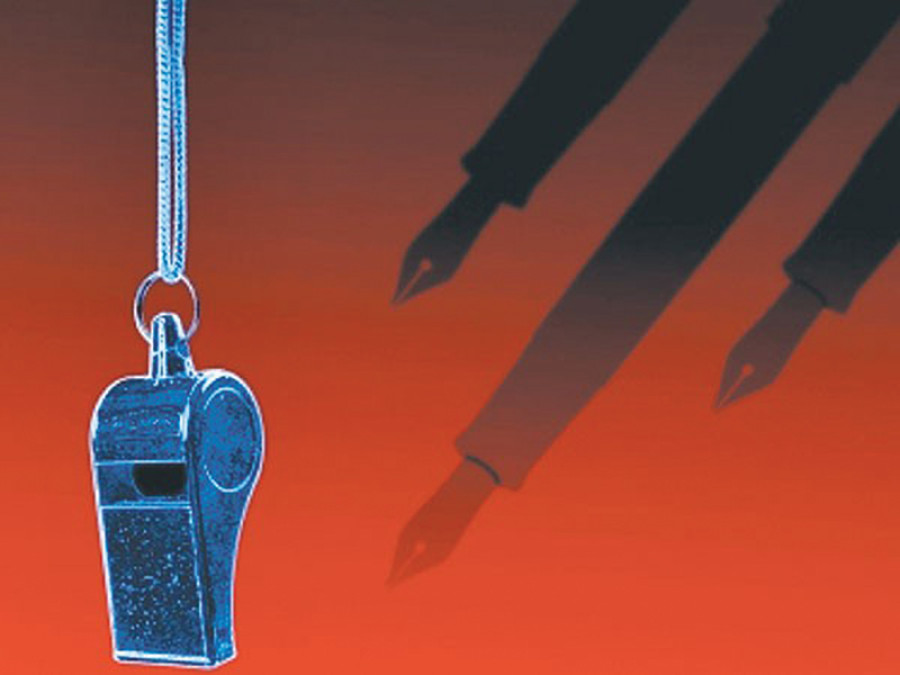Opinion
Value differing opinions
The new code has provisions that limit free expression and criminalise media lapses
Binod Bhattarai
Is August 2018 the beginning of the end of free expression and, by extension, democracy, in Nepal? Let’s hope that’s not the case. Imagine a situation where the media could only report what it was told and photographers could take pictures only with permission. Then we would have not heard about the excesses and lapses of the former chiefs of constitutional bodies or seen ministers disregarding traffic barriers on the main roads. Therein lies the role of the media: To take risks, remain alert, report what it comes across, make mistakes and tell people what is going on.
This risk that journalists take could be a thing of the past with the new legislation. The new criminal code that replaces the Muluki Ain introduced 165 years ago marks the end of a period in history. It seeks to modernise the criminal justice system. However, the code also has provisions that limit free expression and criminalise media lapses instead of regulating it through civil sanctions. The law went into effect in mid-August, and in the absence of a separate law relating to the media, it will prompt journalists to take fewer risks, under-report, self-censor or just broadcast approved propaganda.
Media organisations have rightfully demanded changes in the law, but that may not be enough unless they also seek changes in the related provisions in the constitution. The restrictions allowed by the constitution on expression (and media rights) include “any act which may undermine the sovereignty, territorial integrity, nationality and independence of Nepal or the harmonious relations between the Federal Units or the people of various castes, tribes, religions or communities or incite caste-based discrimination or untouchability or on any act of disrespect of labour, defamation, contempt of court, incitement to an offence or on any act which may be contrary to public decency or morality.”
While some may argue that these limitations are required to protect the ‘sovereignty, territorial integrity, nationality and independence’ because they concern national security, it is impossible to understand how speech could threaten the ‘harmonious relations’ between the federal units. Not long ago, there were media reports about how the provinces were unhappy at the federal government’s bossiness. Does the harmony clause come into play here? Why? And, why not? Tomorrow, the provinces may compete for control over natural resources, and the competition may be anything but harmonious.
Further, where does the discourse we have had among various castes, tribes and religions and communities for equal rights come under the harmony clause? Or is the constitution trying to prevent such discussions from taking place because social relations are now perfect? My point here is that the change has to begin with the constitution itself. Given that the restrictions on expression also contravene the International Covenant on Civil and Political Rights (ICCPR), the government can settle this debate once and for all. Its options are to amend the provisions to make them compatible with international norms or pull out from the UN treaty.
I fully agree that the media must not be given free rein because they also need to function under the laws of the land. It needs to be regulated through civil sanctions because expression is a building block for contestations that are intrinsic to democracy. Decriminalisation of violations by the media has become standard practice in the established democracies because the leaders there understand that even though journalism can be a nuisance to the rulers, it is essential for democracy to flourish.
This is one reason why the government needs to consider removing the controls in the criminal code and prepare a separate law for regulating media operations. Another reason is that democracy allows people to change their rulers, and after this set of rulers are out of power, the same laws could be used against them to stifle dissent. The value of differing opinions is too dear to forego. Therefore, the government should take to heart two messages from the constitutional conference and do what is right: Fix the constitution and the criminal code to create space for expression that suits a democracy.
- Bhattarai is a media development and communication consultant.




 9.7°C Kathmandu
9.7°C Kathmandu










